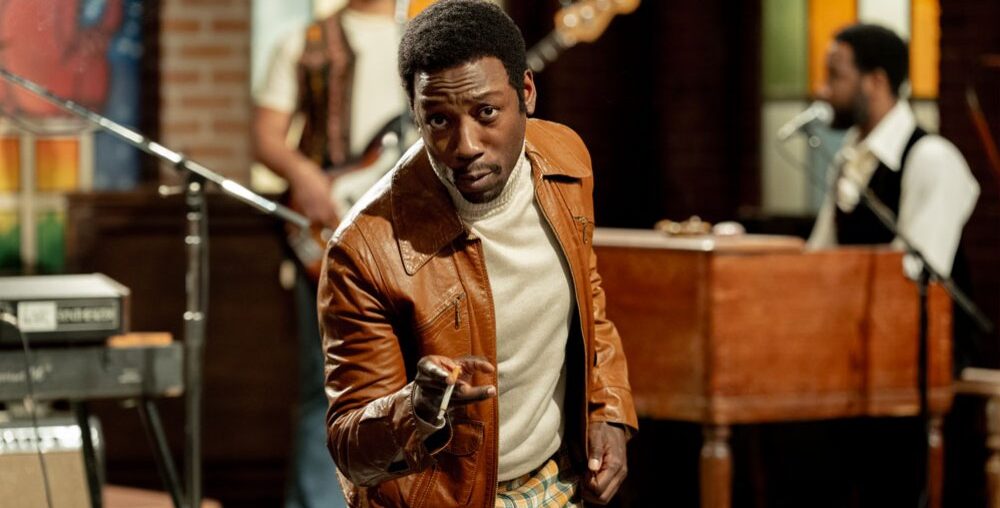When Lamorne Morris was cast as Garrett Morris (no relation) in “Saturday Night” — the movie about the 90 minutes leading up to the first 1975 broadcast of “Saturday Night Live” — he ignored explicit instructions from director Jason Reitman by reaching out to the man he was to portray.
Garrett Morris’ place in “SNL” lore is unique: He was the sketch-comedy show’s first Black cast member. Morris, then a 37-year-old playwright and singer, was originally hired as a writer, but after “SNL” creator Lorne Michaels got hip to his work in the 1975 comedy “Cooley High,” he was asked to audition to be one of the “Not Ready for Primetime Players.” In the film, Morris struggles to find his place in the ensemble, alongside seasoned improvisers like John Belushi and Gilda Radner.
“That’s why it was important for me to talk to Garrett. Because I wanted to make sure that he was actually going through this stuff,” says Lamorne Morris, who was joined by Garrett in a Zoom conver- sation. Lamorne explains that Reitman had told the “Saturday Night” actors not to worry about doing an impression, but to “embody what they may have been feeling” on that high-pressure evening.
So, in March, before filming began, the Morrises spent an hour chatting about Garrett’s experiences during the show’s first five years.
“Your interpretation of that is what it was,” Garrett says, having seen the finished film. He says he struggled with the responsibility of being the only Black member of the show’s creative team. “With ‘Saturday Night Live,’ suddenly I was representing Black. My attitude toward comedy was abstract — I was ready to do comedy that made fun of Black and white.”

Lamorne Morris as Garrett Morris in “Saturday Night”; Garrett Morris in the cast of “Saturday Night Live” in 1977.
Mid-conversation, a third guest appears on the screen: Lamorne has called his mother, Gwennett Morris, into the room to say hello. At the start of the interview, Garrett joked that he’d previously thought about asking Lamorne to see a picture of his mother “just in case” he might be his dad. “But I didn’t know whether you or your mama would slap my face.” Lamorne cracked up at the suggestion, then quietly orchestrated a face-to-face.
“Don’t you remember me?” Gwennett teases, waving at Garrett, who looks sheepish.
“Yes, I do, but we’ll have to talk later,” he says with a laugh. “You produced a beautiful, talented son. He’s going to be a GOAT and have a whole lot of people attached to his career and asking for him to live for them.” He then turns to Lamorne, sounding paternal. “But don’t you do it. You live your own true life, man, OK? You do it the way you think it, the way you feel it, and fuck everyone else’s opinion.”
Indeed, Lamorne, who is best known for the Fox comedy “New Girl,” is experiencing a career high point. The Sunday before our sit-down, he won his first Emmy Award for his work on “Fargo,” and despite being unrelated, Garrett could hardly contain his pride.
“When I heard that, I was filled with endorphins and dopamine,” he says, beaming. “I love that word ‘dopamine’ — that’s a scientific term, did you know that?” Not missing a beat, Lamorne quips: “Is that why they call it dope?”

Lamorne Morris poses with his trophy for outstanding supporting actor in a limited or anthology series or movie for “Fargo” at the Emmy Awards on Sept. 15.
Frazer Harrison/Getty Images
With that kind of timing, it’s no surprise that Lamorne slipped effortlessly into Garrett’s persona for “Saturday Night,” even pulling off a riff on the comedian’s classic, controversial “Death Row Follies” singing-prisoners sketch. “I don’t know if Lamorne is a trained singer, but that’s my original,” Garrett notes. “I liked what he did. He brought a lot of class, and I’m honored.”
Backstage at the Emmys, Lamorne declared that he’d like to host “Saturday Night Live” as the show celebrates its 50th anniversary season.
“Garrett, you’ve gotta call Lorne. I want to host, but I need you to be on it too,” Lamorne says. I got the Emmy. I’m playing an icon. Why not?”
“You know what? I’ve never hosted,” the elder Morris replies, agreeing to the plan. “But I wouldn’t want to take from your glory. If you get it, do it yourself. At 87, I want to be realistic. I don’t want to be in hell when this happens.”

Lamorne Morris and Garrett Morris with “Saturday Night Live” alum Leslie Jones at the American Black Film Festival Honors on March 3.
Kelvin Bulluck for Nice Crowd

